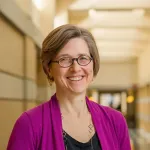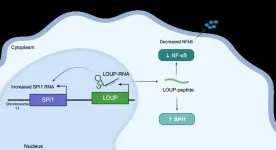(Press-News.org) Since the launch of ChatGPT 3 in November 2022, we've been abuzz with talk of artificial intelligence: is it an unprecedented opportunity, or will it rob everyone of jobs and creativity? As we debate on social media (and perhaps use ChatGPT almost daily), generative AIs have also entered the arena of university communication. These tools—based on “Large Language Models” that were optimized for interactive communication—can indeed support, expand, and innovate university communication offerings. Henke analyzed the situation of German realities about six months after the launch of ChatGPT 3: "The research was conducted about a year ago when enthusiasm was high, but it was still early for people to understand the potential of the medium", he explains.
This initial early monitoring showed that usage was already widespread at that point. Henke distributed a questionnaire to all press/communication offices of the country's universities, receiving 101 responses, about a third of the total. Practically all those who responded declared that they make some use of generative AIs.
Translations, text corrections and text generation are the main uses recorded by Henke. The other functions suggested in the questionnaire—image creation, slide production, or document analysis—are instead marginal. "What we observe in this initial work is that as far as communication is concerned, artificial intelligence is adopted by universities mainly to increase process efficiency, for example, to speed them up, doing more things in less time," explains Henke.
What also emerges, especially in some open answers, is a certain caution and growing awareness towards ethical aspects. An example is data protection. "For instance, one wonders whether it is wise, or right, to feed these intelligences—owned by private companies—with university data. The issue of privacy is also important," comments the researcher. In this sense, "more and more universities in Germany are releasing their own instances of generative AI chatbots, on dedicated servers", precisely to try to maintain control over these delicate aspects.
"There is not only a technological shift underway but also a cultural one," adds Henke. "Usually the early adopters tend to be younger and fresher in the profession, more open to change." The problem highlighted, however, is that there is no policy that works for everyone. Many are also worried by the possibility that these technologies could replace jobs. "You need the social aspect of technology adoption to be taken seriously," Henke recommends.
Henke, who is now working on a new survey to assess the situation a year after the first, believes he will observe further evolution of the situation: "I know that the use of generative AI tools is bound to increase", he says. "Last year people were experimenting, but in the comments, they also explained that sometimes they were not satisfied with the results. It was probably a matter of competence. They didn't know, for example, how to make an effective prompt for their goals. Probably today this aspect will have improved. We have to now turn our head and focus on a more strategic and integrated AI approach", especially in light of the continuous updates and advancements of these tools (just a few days ago, Chat GPT 4o was launched, sparking new controversies regarding security, even among the staff of Open AI, the company that owns Chat GPT)."
Henke believes it is important that universities learn to use these new instruments without calling into question the work they have done so far and the future goals they have already planned. "Communication is about building relationships and trust. In particular, one of the main purposes of science communication (of which university communication is a particular case) serves to build trust and relationships between the public and scientific research. If you compromise these relationships using 'automated' press releases or mainly use bots to talk to the public, the latter will end up losing interest or worse, start having doubts about the institution itself. It's important that humans remain part of the process. Artificial intelligence should enhance communication, not replace it", concludes Henke.
END
Will generative AI change the way universities communicate?
A new study in JCOM monitors changes in university communication within the German landscape
2024-05-27
ELSE PRESS RELEASES FROM THIS DATE:
Artificial Intelligence could help cure loneliness, says expert
2024-05-27
Artificial Intelligence (AI) technology could offer companionship to lonely people amid an international epidemic of loneliness, says a robotics expert.
Tony Prescott, a professor of cognitive robotics at the University of Sheffield, argues in his new book The Psychology of Artificial Intelligence that ‘relationships with AIs could support people’ with forms of social interaction..
Loneliness has been found to seriously impair human health, and Professor Prescott makes a case that advances in AI technology could ...
Echidnapus identified from an ‘Age of Monotremes’
2024-05-26
Published today in the Alcheringa: An Australasian Journal of Palaeontology, evidence of an ‘Age of Monotremes’ has been unearthed by a team of Australian scientists at the Australian Museum (AM), Museums Victoria and Australian Opal Centre.
The findings were led by two renowned mammalogists, Honorary Associate of the Australian Museum, Professor Tim Flannery; and Professor Kris Helgen, Chief Scientist and Director of the Australian Museum Research Institute (AMRI).
Found in the Lightning Ridge opal fields, NSW, the opalised jaws ...
Semaglutide may protect kidney function in individuals with overweight or obesity and cardiovascular disease
2024-05-25
The SELECT Trial has revealed the potential of semaglutide, a glucagon-like peptide-1 (GLP-1) receptor agonist, in combating kidney function decline among individuals with overweight or obesity and established cardiovascular disease but without diabetes.1
Unveiling the results today at the 61st ERA Congress, researchers presented the impressive secondary analysis from the SELECT (Semaglutide Effects on Heart Disease and Stroke in Patients with Overweight or Obesity) trial, a randomised trial comprising a participant pool of 17,604 individuals.
Experts believe the study’s results offer hope for those affected by obesity, a condition known ...
New technique detects novel biomarkers for kidney diseases with nephrotic syndrome
2024-05-25
A groundbreaking study, presented today at the 61st ERA Congress, has uncovered a significant breakthrough in the diagnosis and monitoring of kidney diseases associated with nephrotic syndrome.1
Using a hybrid technique, researchers identified anti-nephrin autoantibodies as a reliable biomarker for tracking disease progression, opening new avenues for personalised treatment approaches.
Nephrotic syndrome, characterised by elevated protein levels in the urine, is linked to kidney diseases such as minimal change disease (MCD), primary focal segmental glomerulosclerosis (FSGS), and membranous nephropathy (MN). The primary cause behind nephrotic syndrome is damage to podocytes, the ...
Political elites take advantage of anti-partisan protests to disrupt politics
2024-05-24
Protest movements that reject political parties have an unintended consequence, according to new research from the University of Notre Dame: They empower savvy politicians who channel them to shake up the status quo.
The findings provide a framework for understanding recent global political realignments and offer lessons for activists who want to make a meaningful impact. They are particularly relevant in an era when mass protests have become an increasingly common tool to voice dissent with powerful institutions and draw attention to overlooked issues ranging from climate and conflict ...
Tiny target discovered on RNA to short-circuit inflammation, UC Santa Cruz researchers find
2024-05-24
UC Santa Cruz researchers have discovered a peptide in human RNA that regulates inflammation and may provide a new path for treating diseases such as arthritis and lupus. The team used a screening process based on the powerful gene-editing tool CRISPR to shed light on one of the biggest mysteries about our RNA–the molecule responsible for carrying out genetic information contained in our DNA.
This peptide originates from within a long non-coding RNA (lncRNA) called LOUP. According to the researchers, ...
Charge your laptop in a minute? Supercapacitors can help; new research offers clues
2024-05-24
Imagine if your dead laptop or phone could charge in a minute or if an electric car could be fully powered in 10 minutes.
While not possible yet, new research by a team of CU Boulder scientists could potentially lead to such advances.
Published today in the Proceedings of the National Academy of Sciences, researchers in Ankur Gupta’s lab discovered how tiny charged particles, called ions, move within a complex network of minuscule pores. The breakthrough could lead to the development of more efficient energy storage devices, such as supercapacitors, said Gupta, an assistant professor of chemical and biological engineering.
“Given the critical role ...
Scientists discover CO2 and CO ices in outskirts of solar system
2024-05-24
ORLANDO, May 24, 2024 – For the first time, carbon dioxide and carbon monoxide ices have been observed in the far reaches of our solar system on trans-Neptunian objects (TNOs).
A research team, led by planetary scientists Mário Nascimento De Prá and Noemí Pinilla-Alonso from the University of Central Florida’s Florida Space Institute (FSI), made the findings by using the infrared spectral capabilities of the James Webb Space Telescope (JWST) to analyze the chemical composition of 59 trans-Neptunian objects and Centaurs.
The pioneering study, published ...
Theory and experiment combine to shine a new light on proton spin
2024-05-24
NEWPORT NEWS, VA – Nuclear physicists have long been working to reveal how the proton gets its spin. Now, a new method that combines experimental data with state-of-the-art calculations has revealed a more detailed picture of spin contributions from the very glue that holds protons together. It also paves the way toward imaging the proton’s 3D structure.
The work was led by Joseph Karpie, a postdoctoral associate in the Center for Theoretical and Computational Physics (Theory Center) at the U.S. Department of Energy's Thomas Jefferson National Accelerator Facility.
He said that this decades-old mystery began with measurements of the sources of the proton’s spin in ...
PKMYT1, a potential ‘Achilles heel’ of treatment resistant ER+ breast cancers with the poorest prognosis
2024-05-24
Up to 80% of breast cancer deaths occur in patients with tumors that express estrogen receptor-alpha. Although these estrogen receptor-positive (ER+) breast cancers often initially respond to standard treatment that combines endocrine therapies with CDK4/6 inhibitors, drug resistance often develops leading to lethal metastatic disease that spreads from the breast and does not respond to available treatments.
Looking to identify new vulnerabilities in this type of cancer that could lead to improved therapies, ...
LAST 30 PRESS RELEASES:
Billion-DKK grant for research in green transformation of the built environment
For solar power to truly provide affordable energy access, we need to deploy it better
Middle-aged men are most vulnerable to faster aging due to ‘forever chemicals’
Starving cancer: Nutrient deprivation effects on synovial sarcoma
Speaking from the heart: Study identifies key concerns of parenting with an early-onset cardiovascular condition
From the Late Bronze Age to today - Old Irish Goat carries 3,000 years of Irish history
Emerging class of antibiotics to tackle global tuberculosis crisis
Researchers create distortion-resistant energy materials to improve lithium-ion batteries
Scientists create the most detailed molecular map to date of the developing Down syndrome brain
Nutrient uptake gets to the root of roots
Aspirin not a quick fix for preventing bowel cancer
HPV vaccination provides “sustained protection” against cervical cancer
Many post-authorization studies fail to comply with public disclosure rules
GLP-1 drugs combined with healthy lifestyle habits linked with reduced cardiovascular risk among diabetes patients
Solved: New analysis of Apollo Moon samples finally settles debate about lunar magnetic field
University of Birmingham to host national computing center
Play nicely: Children who are not friends connect better through play when given a goal
Surviving the extreme temperatures of the climate crisis calls for a revolution in home and building design
The wild can be ‘death trap’ for rescued animals
New research: Nighttime road traffic noise stresses the heart and blood vessels
Meningococcal B vaccination does not reduce gonorrhoea, trial results show
AAO-HNSF awarded grant to advance age-friendly care in otolaryngology through national initiative
Eight years running: Newsweek names Mayo Clinic ‘World’s Best Hospital’
Coffee waste turned into clean air solution: researchers develop sustainable catalyst to remove toxic hydrogen sulfide
Scientists uncover how engineered biochar and microbes work together to boost plant-based cleanup of cadmium-polluted soils
Engineered biochar could unlock more effective and scalable solutions for soil and water pollution
Differing immune responses in infants may explain increased severity of RSV over SARS-CoV-2
The invisible hand of climate change: How extreme heat dictates who is born
Surprising culprit leads to chronic rejection of transplanted lungs, hearts
Study explains how ketogenic diets prevent seizures
[Press-News.org] Will generative AI change the way universities communicate?A new study in JCOM monitors changes in university communication within the German landscape



